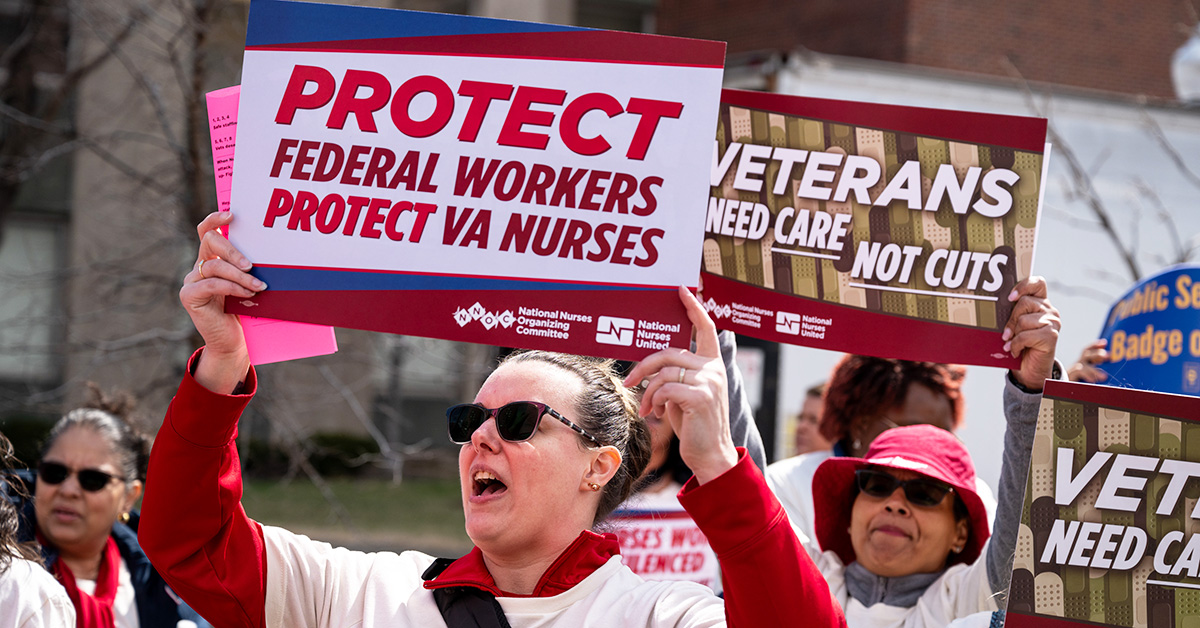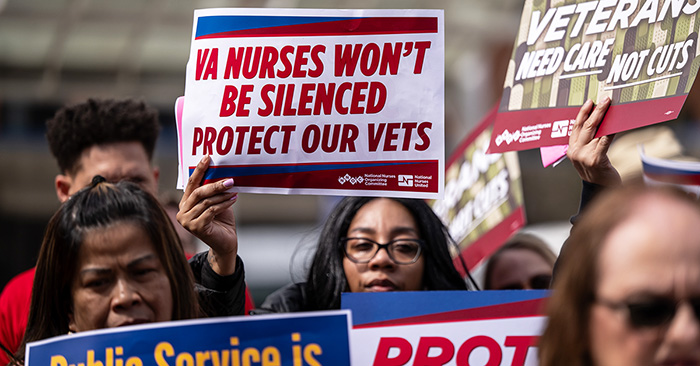Never Giving Up

VA nurses fight to stop staffing cuts and attacks on bargaining rights
By Chuleenan Svetvilas and Rachel Berger
National Nurse magazine - April | May | June 2025 Issue
With federal unions and veterans under attack, VA nurses are standing up and fighting back. From coast to coast, registered nurses who work at Veterans Health Administration (VA) facilities have been sounding the alarm to stop devastating cuts to the VA and calling out attempts to privatize the VA and fighting to protect union rights for federal employees.
“We know what we’re witnessing is an effort to push the VA past its breaking point,” said Irma Westmoreland, RN and chair of National Nurses United’s VA Division, at the Unite for Veterans, Unite for America rally in Washington, D.C. on June 6, the 81st anniversary of D-Day. Westmoreland is also secretary-treasurer of NNU. “The ultimate goal is to privatize the VA and pour billions of taxpayer dollars into giant health care corporations and the pockets of billionaires instead of the veterans who served our country.”
In early March, VA Secretary Doug Collins confirmed that the goal was to go back to 2019 staffing levels at the VA. But nurses say a “reduction in force” (RIF), as the VA calls it, in the range of 70,000 to 80,000 workers is unconscionable, especially when hundreds of thousands more veterans have enrolled in the VA health care system since 2019. Many of these enrollees became eligible for care at the VA due to the passage of the PACT Act (Honoring our Promise to Address Comprehensive Toxics Act of 2022), which expanded VA health care eligibility to veterans who had been exposed to harmful chemicals, such as toxic burn pits, Agent Orange, and other substances during their service.
Nurses say that VA has been short-staffed for years. National Nurses Organizing Committee (NNOC), an affiliate of National Nurses United (NNU), represents more than 15,000 nurses at 23 VA facilities. Under the Biden administration, VA nurses were already stretched too thin due to various hiring freezes and an extremely slow and bureaucratic hiring process that left RN applicants waiting for many months before being extended an offer. In 2024, the VA Office of Inspector General reported that 82 percent of VA facilities reported severe shortages of nurses.
“Every day we feel the effects of the current staffing crisis as nurses struggle to provide timely therapeutic care to veterans without the nursing or support staff we need,” said Sharda Fornnarino, RN and NNU Denver VA director. “Sec. Collins has said he will not cut ‘mission critical’ staff, but we know ancillary staff are critical to providing care to our veterans.”
“When we don’t have housekeeping staff, lab technicians, or dietary personnel, all those duties become the nurses’ responsibility,” said Fornnarino, who is also a Navy veteran. “This takes valuable time away from a nurse who should be caring for the clinical needs of their patients. We are shortchanging veterans who may need emotional and educational support after receiving a life-changing diagnosis. Now is not the time to shrink the VA but rather grow the VA so we can fulfill our mission and our promise to be there for veterans in their times of need.”
The firing of federal probationary employees, including VA staff, began in February and then some were reinstated in response to a court order. Although registered nurses were exempt from that round of firing, the loss of ancillary staff meant that nurses were forced to do the work of supply clerks, dietary staff, and housekeeping — running to other floors to find basic supplies like IV bags and bandages, delivering meal trays, and cleaning rooms.
VA nurses faced another challenge on March 27, when the administration issued an executive order that attempts to take away federal workers’ collective bargaining rights claiming “national security” is at issue. In response, NNOC/NNU joined a lawsuit with four other unions challenging the executive order, alleging that the executive order is a retaliatory attempt to punish federal employee unions that have been engaging in constitutionally protected speech (See sidebar “Unions sue over federal union busting”).
“It is because of our unwillingness to back down that nurses and other unions are feeling the retribution that came down on March 27 with an executive order designed to strip us of our union rights,” said Westmoreland at the Unite for Veterans rally at the National Mall, which dozens of VA nurses also attended. “It is union busting and intimidation, plain and simple. But we’re fighting back!”

Nurses hit the streets and began holding rallies across the country at their facilities (See sidebar, “VA Nurses Rally from Coast to Coast”). They also urged people to call their members of Congress to tell them to protect the union rights of VA nurses and federal employees.
In April, Fornnarino testified before the Steering and Policy Committee of the U.S. House of Representatives, stating, “We fear for the future of the Veterans Health Administration...In the short term, our vets will experience longer wait times, have their treatments delayed, and will likely see reduced access to specialized care. In the long term, our patients will have a harder time accessing any care at all, leading to increases in emergency room care and even deaths.”
Fornnarino spoke about nurses being on the front lines fighting to stop the cuts and concluded her remarks about VA nurses’ ability to organize and collectively bargain being at risk. “The Trump administration’s recent executive order targeting federal workers’ right to bargain is egregious,” testified Fornnarino. “Union advocacy and representation allow nurses to focus on what we do best: caring for our patients.”
In early May, VA nurses traveled to Washington, D.C., to meet with lawmakers and lobby for the NNU-sponsored VA Employee Fairness Act (S. 1650, H.R. 3261), which would ensure full collective bargaining rights for nurses and other clinicians in the VA. Currently, provisions in Section 7422 limit the collective bargaining rights of VA nurses. On May 7, Sen. Tammy Duckworth and Rep. Mark Takano reintroduced the VA Employee Fairness Act, which would repeal those provisions and give VA nurses the ability to bargain collectively on issues related to patient care.
On May 20, VA nurses held a congressional briefing to share their stories about the state of veterans’ health care and the impact of the harmful actions by the current administration. Takano, the House Veterans’ Affairs Committee ranking member, also spoke at this virtual event. NNU invited members of Congress and their staff to attend the briefing to hear directly from nurses about staffing cuts and the administration’s attempts to silence nurses’ advocacy. Participating VA nurses included Monica Coleman, RN in Chicago, Ill.; Sharda Fornnarino, RN in Denver, Colo.; Andrea Johnson, RN in San Diego, Calif.; Mildred Manning-Joy, RN in Durham, N.C.; Esteban Ramirez-Orta, RN in New York, N.Y.; and Irma Westmoreland, RN in Augusta, Ga.
At the briefing, Andrea Johnson, NNOC/NNU director for the San Diego VA, talked about the moral distress she and her colleagues were experiencing due to the staffing crisis at the VA. “Every day that our employers decide to understaff our units, we have to make impossible decisions of who receives care and who doesn’t,” said Johnson. “Due to our staffing levels, I’ve had to leave my patient and go to the pharmacy on another floor because there was no one on staff to deliver medications. I waited 25 to 30 minutes for the medication, which my patient needed urgently.”
Monica Coleman, NNOC/NNU director for the Lovell Federal Health Care Center in North Chicago, noted that many of her patients have built a thorough care plan with a strong team of providers and that it “often takes many years to find the providers they trust and to create a care plan they can stick with.” With cuts looming, her patients are afraid that members of their care team could be fired or leave, and their care will slip through the cracks.
In June, Fornnarino and Westmoreland appeared on the Working People podcast, a partnership with In These Times and the Real News Network, to discuss cuts to the VA and the attacks on federal workers. Westmoreland was also interviewed on the America’s Work Force Union Podcast about the impact of cuts on veterans and the VA Employee Fairness Act. They urged listeners to call their representatives and senators to stop cuts to the VA and to support the bill.
“No matter what executive orders are out there, we are going to stand for the right thing for our patients,” said Westmoreland on the America’s Work Force Union Podcast. “In the VA, we have a lot of patients who don't have support...We are their support. We are their family. We are the people that hold their hand when they're going through difficult diagnoses. We're the person who is standing there when that patient's in hospice and they're taking their last breath. We want to be standing there with them so no veteran dies alone.”
Chuleenan Svetvilas and Rachel Berger are communications specialists at National Nurses United.